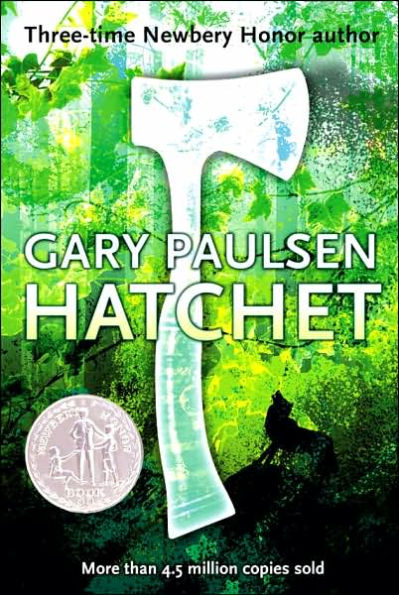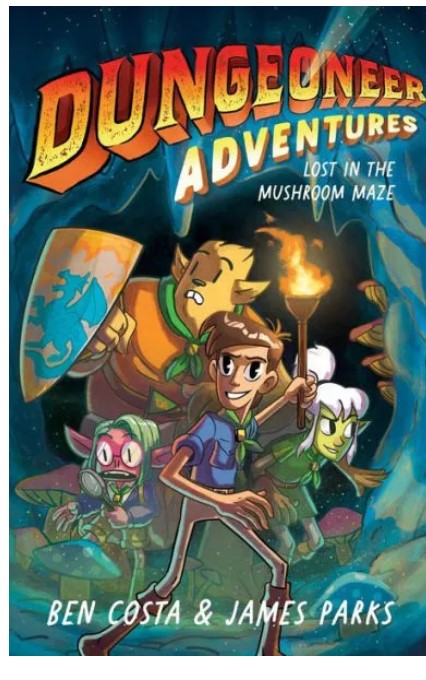Thirteen-year-old Brian Robeson is struggling after his parents’ divorce. Brian has been keeping a dreadful secret from his father. Brian is on his way to visit his father when the single-engine plane crashes in the Canadian wilderness. When the plane sinks, Brian is left with nothing but a tattered windbreaker and the hatchet his mother gave him as a present.
Brian has no time for anger, self-pity, or despair—it will take all his know-how and determination to survive. He will need to build a shelter, find food, and battle the elements. Will Brian have enough courage to survive?
Fans of survival stories will find Hatchet an interesting story of man vs. nature. While most of the story focuses on Brian’s struggle to survive, he is also struggling with keeping a secret. Most of the story’s conflict is internal. However, there are also several intense scenes when Brian must battle nature—both a tornado and an angry moose.
Brian’s experiences change him and when he is rescued, Brian realizes that he will never be the same. The new Brian is confident in his ability. He observes his surroundings and thinks before speaking. But the most important change is that Brian knows the importance of taking action instead of sulking in self-pity.
Hatchet is a Newberry Honor Book that shows the importance of “willpower, patience, hope, courage, and trusting your instincts.” Because much of the action is internal, readers may struggle with the slower scenes. At the end of the story, readers will find four pages of discussion topics. Readers who are reluctant to tackle Hatchet, but enjoy survival stories should add The Raft by S.A. Bodeen to their must-read list.
Sexual Content
- While on a bike ride, Brian sees his mom in “a station wagon with the man. And she had leaned across and kissed him, kissed the man with the short blond hair, and it was not a friendly peck, but a kiss.” The kiss is described over a paragraph and is referred to several times in the story.
Violence
- Brian must hunt to survive. He hunts birds with a spear. “The bird had sat and he had lunged and the two points took the bird back down into the ground and killed it almost instantly—it had fluttered a bit—and Brian had grabbed it and held it in both hands until he was sure it was dead.” After Brian kills the bird, he “just pulled the skin off the bird. Like peeling an orange, he thought, sort of. . . He quickly cut off the neck with his hatchet, cut the feet off the same way, and in his hand he held something like a small chicken with a dark, fat, thick breast and small legs.” The scene is described over two pages.
- A moose attacks Brian. The moose “took him in the left side of the back with her forehead, took him and threw him out into the water and then came after him to finish the job. . . As soon as he moved, the hair on her back went up and she charged him again, using her head and front hooves this time, slamming him back and down into the water, on his back this time, and he screamed the air out of his lungs and hammered on her head with his fist and filled his throat with water and she left again.” Brian is injured and his ribs are “hurt bad.” The attack is described over two pages.
- A tornado destroys Brian’s shelter. “He was taken in the back by some mad force and driven into the shelter on his face, slammed down into the pine branches of his bed. At the same time the wind tore at the fire and sprayed red coals and sparks in a cloud around him. . . He was whipped against the front wall of the shelter like a rag, felt a ripping pain in his ribs again, then was hammered back down into the sand once more while the wind took the whole, wall. . .”
- The plane that Brian was a passenger in crashes, and the pilot dies. The plane is submerged until a storm brings it up. Brian sees the pilot. “He saw the pilot’s head only it wasn’t the pilot’s head any longer. The fish. . . They had been at the pilot all this time, almost two months, nibbling and chewing and all that remained was the not quite cleaned skull. . .”
Drugs and Alcohol
- None
Language
- God is used as an exclamation three times. For example, Brian thinks about his parents’ divorce, “God, he thought, how he hated lawyers who sat with their comfortable smiles and tried to explain to him in legal terms how all that he lived in was coming apart.”
- When a man finds Brian, the man says, “Damn. You’re him, aren’t you? You’re that kid?”
Supernatural
- None
Spiritual Content
- None










